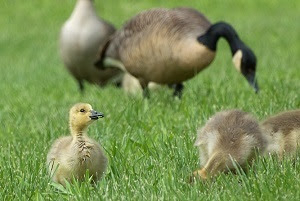
|
|
Around Michigan this spring, some people may find a surprise in their gardens and flower boxes, or even in landscaping near office buildings. Bird nests can be found in some interesting locations. Female mallard ducks often build nests in landscaping, gardens or other unlikely places. If you do come across a duck’s next, simply leave it alone. If the eggs hatch, the mother will lead her ducklings to the nearest body of water, often the day they hatch. Canada geese sometimes build nests near houses or in parks, often near water. Like mallards, geese will lead their young to water soon after hatching. Because adult geese can be protective of nests and young, they may chase people or animals away by hissing and running or flying toward the intruder. If possible, avoid the nesting area. If you must go near the area, carry an umbrella and gently scare the bird away by opening and closing the umbrella. Mute swans also can be plenty protective. As with Canada geese, give the swan family ample room. Try not to walk or boat near the family to avoid conflicts. |

Nests built in your yard already may have baby birds just starting to outgrow them. It’s common to find birds on the ground after a first attempt at flight. If you find one, don’t touch it. The parents will continue to care for it, even on the ground. One exception: If you find a sparsely feathered chick on the ground, it may have accidentally fallen from the nest before it is ready to fly. If you know where the nest is, return the chick only if you can do so safely. Get more tips on handling baby birds, rabbits, fawns and other found wildlife on the DNR’s Keep Wildlife Wild webpage. Only licensed wildlife rehabilitators may possess abandoned or injured wildlife. Unless someone is licensed, it is illegal to possess a live wild animal in Michigan. Find a licensed rehabilitator directory at Michigan.gov/Wildlife or by calling a local DNR biologist. Questions? Contact Holly Vaughn, 313-396-6863. |